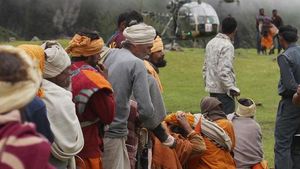In a significant crackdown on illegal activities, the Civil Police of Bahia launched the second phase of Operation "Falsas Promessas" on Wednesday, April 9, 2025, resulting in the arrest of 22 individuals, including military police officers and social media influencers. Leading the operation was the military police officer and digital influencer Lázaro Alexandre Pereira de Andrade, known as Alexandre Tchaca, who was taken into custody alongside four other military officers.
The operation targeted a criminal organization suspected of laundering money through illegal raffles promoted on social media. According to the police, the group managed to move an astonishing R$ 680 million through this scheme, which involved raffles that promised high-value prizes, such as luxury cars, but were manipulated to benefit members of the organization.
Among those arrested was influencer Ramhon Dias, who has a following of 427,000 on social media. Dias had previously been detained during the first phase of the operation in September 2024 but was released on bail and required to wear an electronic ankle monitor. His arrest on Wednesday marked a renewed effort by authorities to dismantle the illegal operations.
Franklin Reis, known as Neka, another influencer who gained popularity through participation in Carlinhos Maia's reality show, was also apprehended during the operation. Reis, who has over 1.1 million followers, is suspected of being involved in the same criminal organization. The police reported that the group utilized social media to attract participants with low-cost raffles, only to manipulate the outcomes to ensure that prizes were awarded to their own members.
During the operation, agents seized luxury vehicles, watches, cash, cell phones, and notebooks. The judiciary authorized the seizure of up to R$ 10 million per CPF (Brazilian individual taxpayer identification) or CNPJ (National Register of Legal Entities) investigated, leading to a total block of R$ 680 million in assets.
The operation was coordinated by the Department for the Repression and Combat of Corruption, Organized Crime, and Money Laundering (Draco-LD), with support from various tactical units of the Civil Police and oversight from the Military Police’s Corregedoria.
According to the police, the organization operated in multiple municipalities, including Vera Cruz, Salvador, Juazeiro, and Nazaré, employing a sophisticated structure of financial transactions. They used shell companies and intermediaries to disguise the origin of the illegally obtained funds, which further complicated the investigation.
In addition to Tchaca, Dias, and Reis, other notable arrests included José Roberto Santos and Gabriela Silva, who are believed to be the leaders of the raffle scheme. They were apprehended in a luxury condominium on Estrada do Coco, a notable area in Salvador. The couple had previously been identified as key players in the criminal organization.
The police have revealed that active and former military police officers played a crucial role in the operation of the illegal raffles, providing protection and privileged information while also directly managing the fraudulent activities.
As the investigation continues, authorities are focused on uncovering the full extent of the criminal network and its operations. The manipulation of raffle results and the use of social media to promote illegal activities have raised significant concerns about the integrity of online gambling and fundraising practices in Brazil.
The impact of this operation is expected to resonate beyond the immediate arrests, as it highlights the growing intersection of social media influence and criminal activity. With the involvement of public figures and law enforcement personnel in such schemes, the operation serves as a stark reminder of the potential for corruption within both the digital and policing sectors.
As the dust settles from this extensive operation, many are left wondering what measures will be taken to prevent similar schemes in the future. The role of influencers in promoting illegal activities raises questions about accountability and the responsibility of social media platforms in regulating content.
In the wake of the arrests, the Civil Police have reiterated their commitment to combating organized crime and ensuring that those who exploit the legal system for personal gain will be held accountable. The operation has not only dismantled a significant criminal organization but has also sent a clear message about the consequences of engaging in illegal activities.
As the investigation unfolds, further developments are anticipated, and the public will be watching closely to see how the authorities address the challenges posed by illegal raffles and the broader implications for social media regulation.









